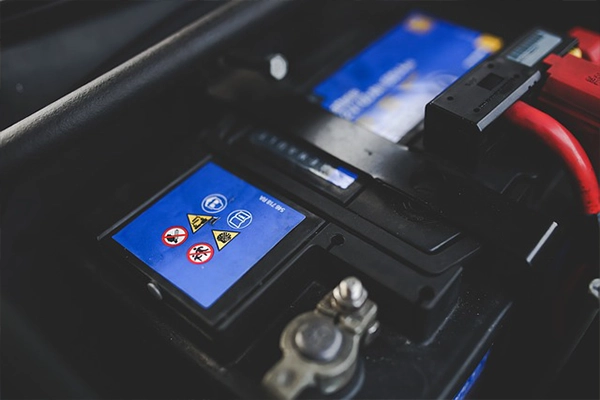What is Leaking from My Car Battery?
Unless your car won’t start, it’s not likely you will give your battery much thought on a day-to-day basis. Unless you pop the hood or look for it in the trunk, you may not even see the battery.
On the occasions when you do need to access the battery in your car, you expect it to look like it did when it was put in. A large, heavy box with two metallic posts on the top. Nothing else. You certainly don’t expect anything to be leaking out from the inside. After all, the fluid inside batteries is dangerous and acidic.
If you notice anything leaking from your car battery, it’s pretty obvious something isn’t right. We are going to go over what exactly is leaking out of it, why it’s leaking, and what you should do about it.
How Does a Car Battery Work?
Car batteries generate and store electricity through chemical reactions. Standard batteries utilize plates of lead and lead dioxide submerged in sulfuric acid, which results in multiple chemical reactions, leading to the generation of electricity. The terminal posts on the top of the battery allow the vehicle to access the electricity it generates.
Car batteries are kept charged by the alternator. Once the vehicle is running, the alternator (which is driven by the engine) powers the electrical systems in the vehicle. Some of the electricity it generates is used to replenish the battery.

What Leaks From a Car Battery?
Sulfuric acid is what leaks out from the inside of a lead-acid car battery. The liquid acid can escape the battery case in a variety of ways.
What Causes a Car Battery to Leak?
There are a few things that can cause a car battery to leak. The reasons can range from battery age or damage to issues with your vehicle’s charging system.
Damage to the Battery
Cracks or other damage to the battery case can cause leaks. If the battery is dropped, not secured correctly, or damaged by an impact the cells can start to leak.
Battery Age
Age is not directly correlated with leaking, but the longer a battery is in use the less reliable it becomes. As a result, there is a higher possibility of leaks occurring.
Over Charging
If there is a problem with the alternator in your vehicle, it can cause the battery to overcharge. Overcharging leads to sulfuric acid in the battery boiling. The acidic steam exits the battery through vent caps and condenses on the surface of the case.
Once outside, the acidic liquid will come into contact with the terminal posts and other metal parts of the battery, causing the corrosion and buildup commonly associated with a leaking battery.
Sulfation
Improper charging, incorrect storage temperatures, and storing a battery with less than a full charge can lead to sulfation. Sulfation is the buildup of lead sulfate crystals inside and outside the battery. Sulfation can contribute to, and look like a leak due to the scaly, multicolored buildup that’s often visible near the terminal posts.
Tipped Over Battery
If a lead acid battery is tipped on its side, the sulfuric acid can leak out through the vents. While this is not an issue with the battery itself, it can be a cause of leaking.
Is a Leaking Car Battery Dangerous?
It can be. The sulfuric acid inside a battery is extremely corrosive and can damage clothing, and vehicle components, and cause burns if it comes into contact with your skin. If your battery is leaking, it should be replaced.
Battery Service at Borst Automotive
If you have a leaking battery, don’t delay in getting it replaced. Borst Automotive is your one-stop for auto repair in Arizona. With locations in Tucson, Phoenix, and Mesa, one of our service centers is a short drive away. Give us a call or schedule an appointment online today!

Borst Automotive is here to help when you need it. Give us a call, schedule an appointment, or stop in today!
